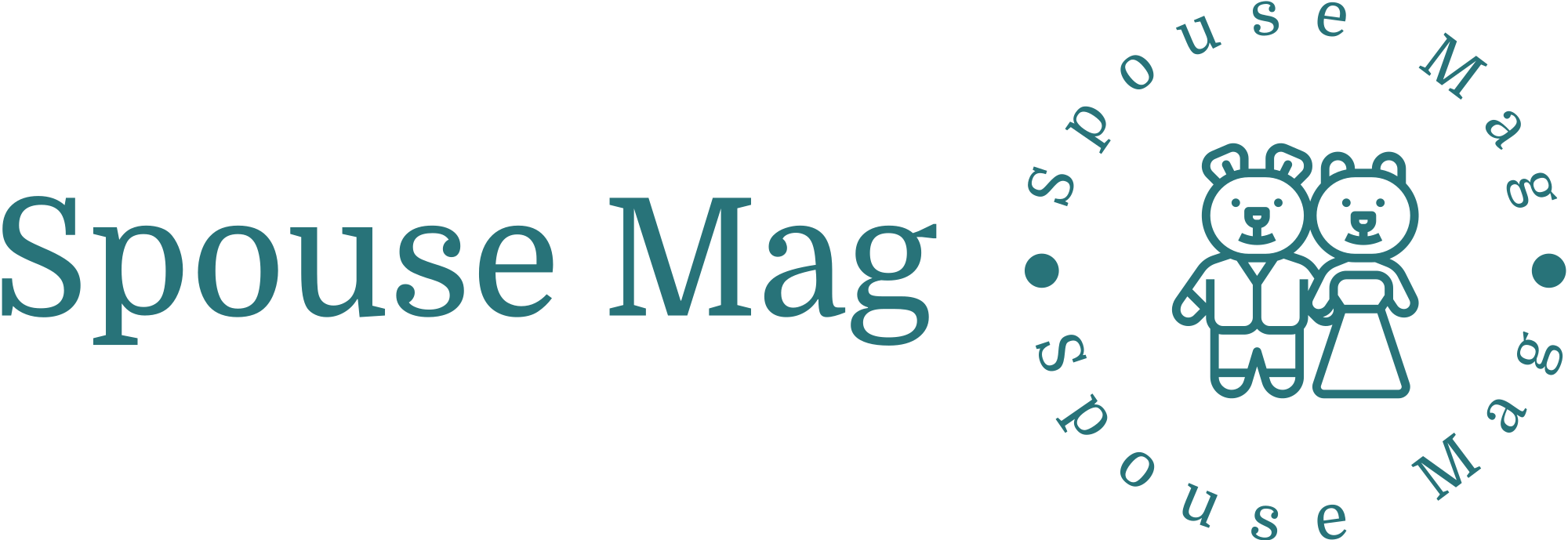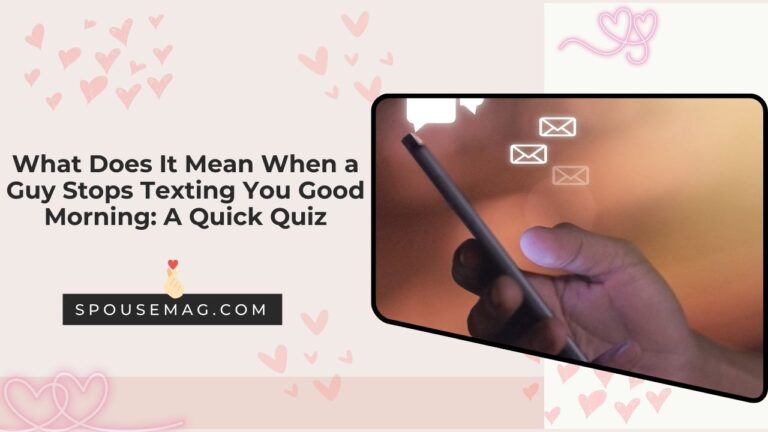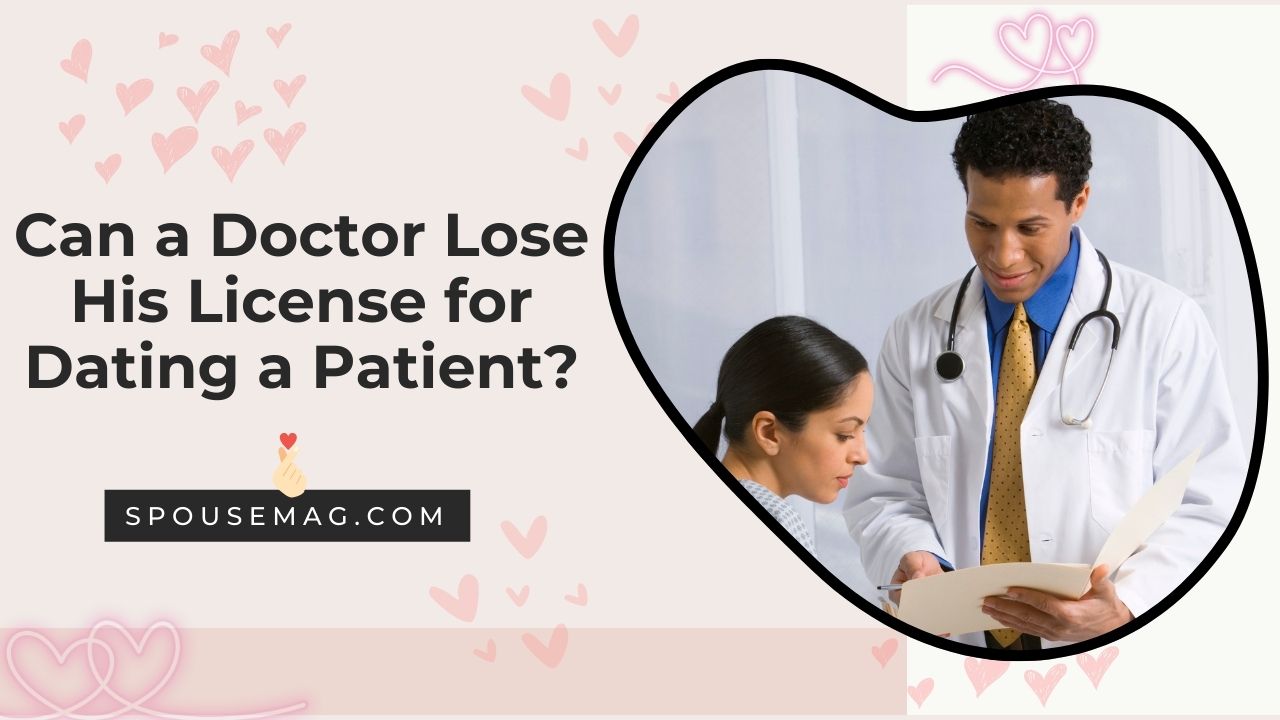
Yes, a doctor can lose his license for dating a patient. It’s considered unprofessional and unethical because it creates a conflict of interest and blurs the lines between personal and professional relationships.
Doctors have a responsibility to maintain a professional boundary to ensure they make the best medical decisions for their patients without personal feelings getting in the way. Breaking this rule can lead to serious consequences, including losing their medical license.
Now, let’s explore why this rule is so important and what happens when doctors break it.
Key Takeaways
- Doctors must maintain professional boundaries with patients to avoid conflicts of interest and ethical dilemmas.
- Romantic and sexual relationships between doctors and patients are strictly prohibited and considered unethical.
- Violating these boundaries can lead to severe consequences, including disciplinary actions, suspension, or revocation of medical license.
- Power imbalances in the doctor-patient relationship make it difficult for patients to give informed consent to a romantic relationship.
- Patients must seek care from a different doctor if their current physician expresses romantic interest.
Ethical Concerns
The doctor-patient relationship is inherently unequal. Doctors possess significant power and influence due to their medical knowledge and the trust patients place in them.
This imbalance can easily lead to exploitation and manipulation, whether intentional or not.
Power Imbalance
Doctors hold a position of authority over their patients. This power dynamic means that a patient might feel pressured into a relationship or may not be able to give fully informed consent.
Even if both parties believe the relationship is consensual, the inherent imbalance can compromise the patient’s ability to make independent decisions.
AMA Code of Medical Ethics
The American Medical Association (AMA) Code of Medical Ethics provides clear guidelines on this issue. It explicitly states that sexual and romantic relationships with current patients are unethical.
These guidelines aim to protect patients from potential harm and maintain the integrity of the medical profession.
According to the AMA, these relationships exploit the trust and dependency patients place on their physicians, ultimately harming the patient’s welfare.
Legal Ramifications
While engaging in a romantic relationship with a patient does not always constitute a legal offense, it can lead to significant professional consequences.
Licensing boards take such breaches of professional conduct seriously, and the repercussions can be severe.
Disciplinary Actions
Licensing boards across different states have the authority to investigate and take action against physicians who violate professional boundaries.
Actions taken by these boards can range from formal reprimands to the suspension and even revocation of the medical license. The severity of the punishment often depends on the circumstances and whether there is evidence of harm or exploitation.
Consequences When a Doctor Dates their Patient
| Disciplinary Action | Description |
|---|---|
| Reprimand | A formal expression of disapproval but no direct impact on the ability to practice. |
| Probation | Restrictions on practice, often with monitoring and conditions to be met. |
| Suspension | Temporary removal of the right to practice medicine. |
| Revocation | Permanent loss of the medical license. |
2 Case Examples
Here are two real-life cases that illustrate the consequences doctors can face for dating patients.
Case 1: Dr. John Smith
Dr. John Smith, a respected family physician, began a romantic relationship with one of his long-term patients. The patient, who was being treated for anxiety and depression, felt pressured to enter the relationship due to Dr. Smith’s authority and influence over her medical care.
When the relationship became known, the patient reported feeling emotionally manipulated and confused. The state medical board launched an investigation into Dr. Smith’s conduct. They found that the relationship had compromised the patient’s ability to give informed consent, given the power imbalance.
As a result, Dr. Smith was found guilty of professional misconduct. His medical license was suspended for two years, and he was required to undergo ethics training before he could apply for reinstatement. This case highlights how a romantic relationship with a patient can lead to severe professional consequences and harm the patient’s well-being.
Case 2: Dr. Laura Jones
Dr. Laura Jones, a well-known psychiatrist, began a relationship with a patient she had been treating for bipolar disorder. The patient believed that the relationship was consensual and reported it to the clinic’s administration only when she felt her mental health was deteriorating.
The clinic reported the situation to the medical board, which then conducted a thorough investigation. They determined that Dr. Jones had violated ethical guidelines by exploiting her position of power and trust. Even though the patient initially agreed to the relationship, the board concluded that her ability to consent was impaired by her mental health condition and the ongoing treatment.
Dr. Jones faced a hearing where her license was revoked due to her breach of professional boundaries and the potential harm caused to the patient. She also faced a civil lawsuit from the patient, which further damaged her professional reputation and financial standing.
Views of 7 People on Doctors Dating Patients
I got the views of the 7 people from across the USA. Let’s see what they had to say:
1. James, 29, Teacher, Los Angeles
James is very clear on this matter. “Doctors hold a lot of responsibility, and dating a patient crosses a professional line. It’s an abuse of power. Losing their license is a just consequence if they exploit that trust.”
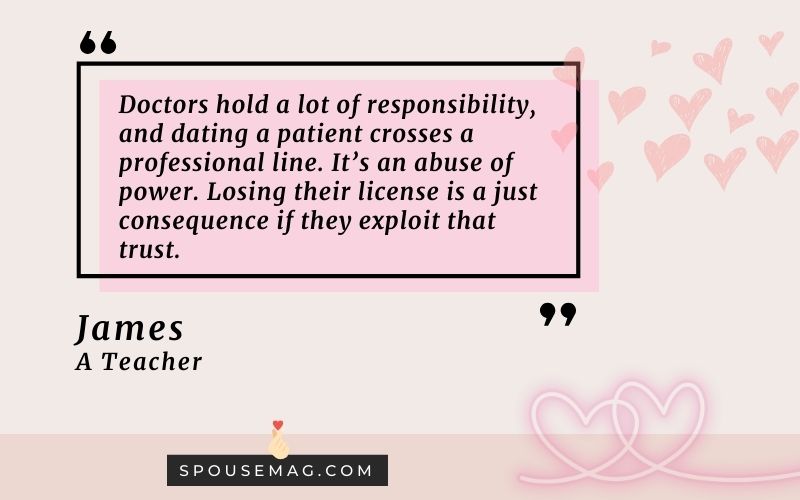
James further explains, “Imagine going to a doctor for help and feeling pressured into a romantic relationship. It’s not fair to the patient. Strict rules are necessary to protect vulnerable individuals.”
2. Sarah, 34, Nurse, Chicago
Sarah emphasizes the importance of boundaries. “Doctors must maintain professional boundaries. Dating a patient compromises the quality of care and trust. Revoking the license is an appropriate action.”
She continues, “Even if both parties consent, the power dynamics are skewed. The patient might not feel they can say no. This leads to serious ethical issues that justify license revocation.”
3. Michael, 42, Engineer, New York
Michael sees it slightly differently. “While understanding the concerns about ethics, a blanket rule isn’t fair. Each situation is unique. If a relationship forms naturally and without coercion, a strict punishment like losing a license isn’t always necessary.”
He adds, “There should be guidelines and consequences, but they need to consider individual circumstances. Not every case is the same, and some might be genuine connections.”
4. Jessica, 28, Social Worker, Austin
Jessica feels strongly about protecting patients. “Patients are in a vulnerable position when seeking medical help. A doctor dating a patient easily exploits that. Strict rules prevent this and justify license revocation.”
She elaborates, “The focus should always be on patient well-being. Any romantic relationship with a current patient compromises that trust. Severe consequences deter such behavior.”
5. David, 35, Lawyer, San Francisco
David brings a legal perspective. “From a legal standpoint, it’s complicated. While unethical, dating a patient doesn’t always mean the doctor loses their license immediately. It depends on the evidence of harm or coercion.”
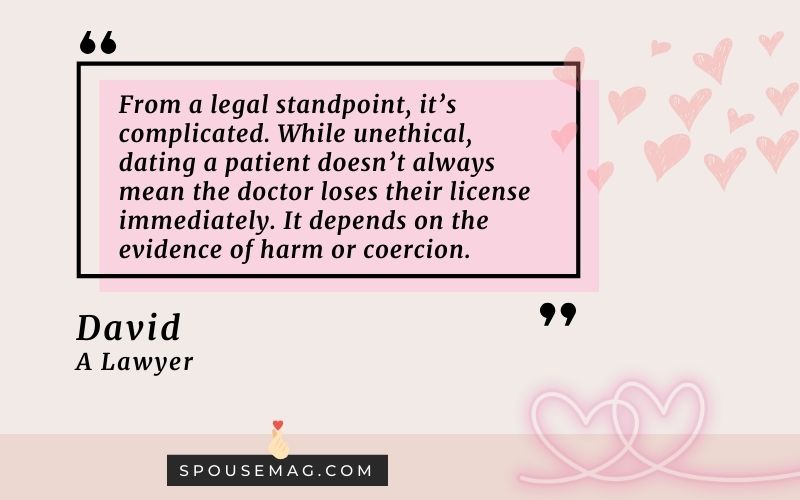
He continues, “Medical boards need to investigate thoroughly. If the doctor truly abused their power, losing the license is appropriate. But it should be a measured response based on the specifics of each case.”
6. Emily, 30, Marketing Manager, Miami
Emily believes in second chances. “Doctors are human too, and they make mistakes. Dating a patient is a lapse in judgment, but it shouldn’t automatically end their career. Counseling and probation are alternatives.”
She explains, “Supporting doctors in understanding why it’s wrong rather than just punishing them harshly is essential. Education and reform prove more effective in some cases than revoking a license.”
7. Robert, 45, IT Specialist, Seattle
Robert holds a more lenient view. “As long as the relationship starts after the patient’s treatment has ended and there’s no exploitation, it shouldn’t be a big deal. People meet in all kinds of ways.”
He adds, “Having rules is important, but they shouldn’t be so rigid that they ignore human emotions. Ensuring there’s no abuse of power is key. If handled properly, a doctor doesn’t necessarily lose their license over this.”
Conclusion
Maintaining professional boundaries is important for the integrity of the medical profession and the well-being of patients. Doctors dating their patients can lead to serious ethical breaches and severe professional consequences, including the potential loss of their medical license.
If a doctor expresses romantic interest, the patient should seek care from a different physician to ensure their safety and well-being.
Professionalism in healthcare is non-negotiable, and upholding ethical standards is essential for preserving trust and providing the highest quality of care.

As a married wife, founder, and editor of SpouseMag.com – these guides are based on my own personal experiences, observations, research and insights. I am transparent about being inspired by the life and work of the two greatest experts in the relationship space – Dr. John and Julia Gottman, and Harville and Helen. They two are some of the strongest couples, researchers, authors, and counselors when it comes to marriage and relationships. My advice and guides are based on my insights and research, and they are not an alternative to professional advice.
